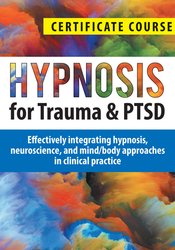Digital Download Immediately
Carol Kershaw - Bill Wade - Hypnosis For Trauma And PTSD

Add additional power to your current clinical approach and make trauma treatment more effective in a shorter period of time when you incorporate clinical hypnosis in your practice.
Hypnosis is gentle, collaborative and powerful in eliciting lasting change in clients. Now you can join long-time Ericksonian-based practitioners, Drs. Carol Kershaw and Bill Wade, in this comprehensive certificate course where they draw on the resource-based approach of Ericksonian Tradition as well as modern brain science and neurology to provide you a step-by-step guide for applying hypnosis to your clinical practice.
Throughout the course, special emphasis will be given to understanding how trauma affects the brain and how hypnosis can be used to alleviate PTSD symptoms such as anxiety, depression, panic, insomnia, obsessive-compulsive behavior and difficulty handling anger.
Whether you’re new to hypnosis or an experienced hypnotherapist, this unique training opportunity can improve both your competence and confidence in resolving entrenched trauma using clinical hypnosis
Join Drs. Carol Kershaw and Bill Wade for this unique video course where they will show you step by step how you can use hypnosis to bypass your client’s conscious limitations and enlist resources from the unconscious to help resolve trauma.
Through case examples, video clips, demonstrations, experiential exercises and hands-on experience, Kershaw and Wade will demystify and simplify hypnosis techniques so you can start using them with your clients immediately.
If you are new to hypnosis, you will gain the skills you need to start using practical hypnosis strategies in your practice.
And if you are an experienced hypnotherapist, you can add clarity, depth, and innovation to your work.
Here’s what you’ll learn to do in this certificate training…
1 Integrate the essential building blocks for safely and easily incorporating hypnosis into clinical practice.
1 Gain client buy-in by learning how to provide effective psychoeducation that includes the research and science behind hypnosis.
1 Alleviate symptoms of trauma and PTSD through focused attention.
1 Enhance your treatment planning by understanding the neuroscience of hypnosis.
1 Advance your clinical assessment skills by understanding how the critical differences among attachment categories impact your clients.
1 Improve clinical outcomes by learning to utilize evidence-based mind/body tools and strategies.
1 Boost trauma symptom resolution with three simple hypnotic strategies.
1 Calm your client’s anxiety, panic, and reactivity by learning how to induce deep hypnotic states.
1 Prevent your clients from getting stuck by learning to recognize and prevent trauma symptoms acting as negative trances.
1 Improve your clients’ level of functioning and emotional stability with three hypnotic protocols.
1 Help clients move forward in clinical treatment with therapeutic strategies for modifying attachment patterns.
You’ll also learn…
Get immediately download Carol Kershaw/Bill Wade - Hypnosis for Trauma and PTSD
Neurophysiology of Trauma/PTSD
Impact of trauma on the nervous system and brain
Impact of stress on the brain
Vagal Nerve Activation-Stephen Porges
Adverse Childhood Experiences (ACES)
Intense and prolonged trauma
Developmental trauma
Seizure activity with trauma
Trauma and Attachment
Attachment styles
Trauma and dissociation style attachment
Attachment and relationships
Latest Neuroscience Research on Body/Mind Healing
Body/mind as frequency, light and innate healing abilities
Discovery of filament structures in the body carrying information
Cellular biophoton release
Long-Term Stress and Its Impact on the Limbic System
Symptoms of limbic over arousal: Anxiety, startle response, panic, obsessive-compulsive patterns, anger, insomnia
Symptoms of limbic under arousal: Depression, negative thinking and altered perception of experiences
Essentials of Clinical Hypnosis
Definition of hypnosis as resource activator
Focused attention and suggestion
Hypnotic language
Conversational hypnosis
Psychotherapy as hypnosis
EEG hypnosis
Putting Clinical Hypnosis to Practice
Simple inductions
Changing mental states
Strategies to interrupt rumination
Strategies for anxiety, depression, and calming the nervous system
Experiential exercises to practice the skills learned
Demonstration: EEG Hypnosis
Strategies for Developing Traumatic Memory Reconsolidation
Retrieval and disruption
How to move a memory from short-term to long-term
State-dependent memory and learning
Focused Attention as a State of Negative or Positive Hypnotic Trance
How optical system may play a role in symptom formation and removal
Focus on “nothing” helps eliminates negative thought
Simple Biofeedback Tools Paired with Hypnosis to Support Post Traumatic Growth
Heartmath HRV Training
Temperature Training
Breath Training and Meditation
Galvanic Skin Response Training
How to Avoid Common Mistakes in Talk Therapy that May Make Trauma Symptoms Worse
Too much attention to feelings
Too much emphases on the trauma story
Carol Kershaw - Bill Wade - Hypnosis For Trauma And PTSD on sunlurn.com